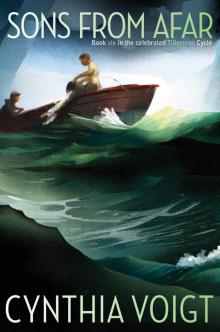- Home
- Cynthia Voigt
The Book of Kings Page 9
The Book of Kings Read online
Page 9
The first to emerge was Mrs. Bendiff, wearing a wide-brimmed yellow hat adorned with four green feathers and a silky green Z. Pia followed her mother, on her head a simple straw boater, its crown circled by red and blue ribbons that had been braided together. The round brim of her hat emphasized the shining white-blond hair that was cropped so short, she might have been a boy disguised as a girl. Mr. Bendiff was the last to get out. He stood for a long moment, fedora in his hand, looking toward the upper decks in a measuring, assessing way.
“Are the Bendiffs traveling on the Estrella?” Tomi wondered, then asked, suspiciously, “They aren’t coming with us, are they, Eyes?”
“Just Mr. Bendiff, I think,” Max said. “The King felt the embassy needed an economic adviser.”
“Oh?” Tomi said, with nothing more than curiosity, but when they saw a fifth figure walk around the front of the motorcar to stand just a little apart from the small family group, they both fell silent.
This was like a play without words, Max thought, like a mime show. When he looked down at the group standing beside the big automobile, he could see their faces and their gestures but he couldn’t hear their words, so he had to guess from their faces and their gestures what was being said.
Mr. Bendiff turned to the fifth figure and his mouth moved. The figure, a boy with corn-colored hair, nodded, picked up three suitcases, one in each hand, one beneath an arm, and stepped onto the gangplank. “That’s not Colly, is it?” Tomi asked. “Isn’t that Colly? What’s he doing here?”
Max was too surprised to answer, but Grammie reminded them, “Ari sent him to work for Mr. Bendiff, didn’t he? And you,” she said to Tomi, “told us how smart he was, and honest, despite what you’d caught him doing. Hamish Bendiff might easily have noticed him, and asked him to come as his personal servant. Like you and Ari.”
“We’ll find out soon enough,” Max said as the motorcar backed slowly through the crowd, away from the docks. The King wouldn’t send the entire Bendiff family to Andesia, would he? Max asked himself unhappily, and was relieved to see the motorcar park itself, out of the way until it was needed again. Mr. Bendiff said something, and bent to kiss Pia on the cheek. He took his wife’s gloved hand and spoke seriously with her for several minutes, while Pia waited with uncharacteristic patience and also an uncharacteristic lack of interrupting. Then Mr. Bendiff wrapped his arms around his wife, kissed her on the lips, patted the top of Pia’s head, and walked alone up into the ship.
Pia and her mother fell into a lively conversation, glancing occasionally at the crowd of people lining the upper decks. As if they were in fact skilled mimes, Max understood that they were discussing Mr. Bendiff’s departure and then something else, something more, about which they were in agreement. Some common interest. But what common interest could Pia have discovered with her silly, social-climbing mother?
Pia saw him then and waved, grinning happily. She gave him a double thumbs-up, to say—he knew exactly what she was saying even if he couldn’t hear a word—that the Solutioneer’s business was in good hands, that he’d done the right and smart thing leaving her in charge. Temporarily in charge, of course, but temporarily in total charge of absolutely everything.
The Private Secretary to the King’s special Envoy to Andesia could not grin and wave back, but he bowed slightly, message received.
Pia continued grinning and waving, ignoring his dignity, and then her gaze shifted to someone standing just along the railing. Max was not surprised to see that it was her father, who looked down at his daughter and his wife. What did surprise him was to see Mrs. Bendiff give her husband the same smiling thumbs-up signal Pia had just given him, and the understanding of what that meant made him laugh out loud. Mr. Bendiff had found solutions to more than one problem when he came to consult the Solutioneer.
As if laughter was his cue, the Envoy entered the scene. He sat alone in an open carriage with the royal crest on its side. The carriage was drawn by two coal-black horses; its driver and the accompanying footman both wore the green livery of the King’s household. Ari’s black tricorn was topped with a curving white plume and his red military jacket was hung with medals. He paid no attention to the people around him, who quickly realized he was only some diplomat, and not a member of the royal family and lost interest; in fact, as soon as his feet were on the ground he removed the tricorn from his head, swung a short dark cape around to cover the glitter of his jacket, and, instead of striding up the gangplank, merged back into the crowd.
Grammie guessed, “He’ll be making his farewells to Gabrielle.”
Max kept his eyes on the head of red hair as Ari slipped through the throng. Grammie was right, of course. Ari stood for several minutes, just looking down into the face of the girl he planned to marry, pastry chef at B’s and wrongfully accused thief, a girl from a mountain village who had neither fine wits nor great beauty to recommend her, only a kind heart and a gift for the plain truth of things—which happened to be the very qualities that won Ari’s admiration, and devotion. “She’s agreed to marry me,” Ari had concluded when he reported to Max that the young woman had approved of his going off at the head of the rescue party. “So you’d better get me back safe, Mister Max.”
The farewell made, plumed hat back on his head and cloak pulled open so that his medals were on display, Ari strode up the gangplank, as self-assured a figure as any prideful Baron Barthold. He turned at the dark opening and raised his hat to the watching people before disappearing. As if the ship had been waiting only for his arrival, the last visitor’s bell sounded and soon the gangplank was being pulled up, the iron entrance clanged shut, and the people on the docks were waving more energetically. The engines rumbled more loudly. Slowly, slowly, the great mass of metal began to move, heavily, almost reluctantly. Guided by two tugboats, the liner backed away from the docks and out into the lake while the drawbridge clanked and groaned as it began its slow ascent.
Max looked at his grandmother. They didn’t need to say anything. But there was something about the moment that made them both say, “It won’t be long now.”
Grammie took a deep breath. “I’m going to get myself a scarf. It’ll be windy, once we pass Porthaven. Do you want one?” Max shook his head. He didn’t want to leave his post.
Mr. Bendiff went to find his stateroom, but Colly, surprised to find Tomi, and pleased to discover that they were cabinmates, hesitated among his valises. Tomi and Colly went off together, Tomi now carrying one of Colly’s burdens. Tomi would explain everything to Colly, Max guessed, and probably Colly would explain how it came about that he’d joined them. Not that Max was really surprised. Max would never be surprised at something unexpected coming from Mr. Bendiff’s corner.
What did surprise him was to see Joachim. His teacher was beside the doorway into the first-class accommodations, blue beret firmly in place, in conversation with Grammie. Grammie pointed to where Max stood at the rail, then went on her way.
“I suppose you’ll send me back on the pilot boat,” Joachim announced when he reached Max’s side.
“Where’s Sunny?” Max was taken off guard, shocked stupid. What was Joachim doing here? How could he afford a ticket of any kind, not to mention first-class? Why wasn’t he at home, in his garden, painting?
“The Bellerephon sisters have her while I’m— You remember them, you must, they were the ones who found Sunny for you. If you send me off on the pilot boat, I warn you, Max, that woman will have me married and moved in and painting pictures of her hats. She’s relentless! She’s heartless! She keeps coming after me and it’s all your fault. It’s up to you to do something about it.”
“But, Joachim—” Max began.
“You’ll have to pay for my ticket, because I’m not supposed to be here. I skulked when they blew the whistle for visitors to leave, but I have my materials with me, so…Expeditions take artists along with them. Even you might know that, and your grandmother certainly does. To make a record of the local flora, and the landscapes,
and animals, too, birds like Audubon or— You shouldn’t send me back, Max, and you know it.”
Max knew no such thing, although he did feel responsible for introducing R Zilla into Joachim’s life. He’d done it with the best of intentions, for which Joachim never gave him credit, but he had done it. “I’ll have to ask Ari,” he said.
“Talk to your grandmother, she’s got a good head on her shoulders,” Joachim advised.
While this was going on, the great ship moved slowly through the raised drawbridge, cast off the lines to the tugboats, and, with a rumbling surge of its engines, followed the small pilot boat downriver, heading for the open ocean.
The journey
By mid-afternoon, the Estrella had entered the open seas, leaving the stone fortress and tall lighthouse of Porthaven behind, and Max had transformed himself into the Secretary. This was too important a job to risk being under-prepared or under-practiced. Until he exited Andesia in the company of his parents, he was Alexander Ireton, Private Secretary to the King’s special Envoy to Andesia. Alexander Ireton dressed in dark suits and stiff white collars; he wore slippers and a robe in the cabin in the mornings; he put on a bowler to take turns around the deck, every morning and every afternoon, around and around the length of the boat, as if the distances he covered on foot could cut down the necessary hours of travel that lay between him and Apapa.
Max did not allow himself to be anything other than the Secretary, not even for an hour. He was no longer a grandson, nor one of three boys adventuring together, nor an amateur skyscapist. He could not even be the Solutioneer. He was always and entirely the Secretary, and never his own self, Max Starling, thirteen-year-old boy, crossing an ocean to rescue his parents.
His thirteenth birthday had been not-celebrated in the Estrella’s large first-class dining room. There had been no candles on no cake, no wrapped packages, and no singing of the traditional birthday song. Only Ari and Mr. Bendiff were at the table with Max, since Grammie, Colly, and Tomi, as servants, took their meals in the second-class dining room with Joachim, who was an artist and without social position. Alexander Ireton was having no birthday, and besides, if he were to be having one it would not have been his thirteenth, and Max had no choice in the matter: He had to be always and only Alexander Ireton.
He might wish that, like Colly, he could move freely down the carpeted stairway to the second-class deck, or farther, down the plain wood stairs to third class, meeting strangers and hearing stories of their destinations and their lives, in the kind of long conversations possible when you travel by ship across wide stretches of empty sea. He might wish to clatter down steep iron stairs with Tomi to reach the engine room, and learn about the great machinery that worked away deep within the ship, and be the one to bring back an American card game the sailors liked, called poker and involving bets. He did wish he could sit out on deck to paint the kind of skies that hang over the ocean, vast blue expanses with white clouds stretched thin as veils across them, or thick, densely gray clouds that lie heavy on a rough-edged gray water, with only the uneasy surge of the metal floor beneath him to remind him he was not, however it seemed, motionless, stuck. Often, Max stood at the bow of the ship under a sky so black and pricked with so many stars that he wished he had a chunk of charcoal in his hand, to draw it.
He had never been so alone.
As the great propellers pushed the Estrella across the ocean, Max was as solitary as an island among the hundreds of people on board, motionless as an island, and helpless as an island to do anything other than wait for the journey’s end.
Mr. Bendiff could be frankly amazed and excited, the whole adventure of an ocean voyage being new to him, but Max could not, even though Max was, like Mr. Bendiff, someone who enjoyed new jobs, new problems to solve, new ideas bursting up in him. Neither could Max spend each day in the happiness of a love left behind and awaiting his return, the pleasures of memory and anticipation, the way Ari did. Grammie could practice her Spanish on native speakers in the second-class dining room, Joachim could sketch a portrait for anyone who offered to pay him, but Max had always and only to be Alexander Ireton. Alexander Ireton spent most of his time in the Envoy’s stateroom, doing whatever secretaries do—in his case, studying Spanish from books and learning history from books, and looking out the porthole at the long stretch of sky over the stretch of restless water. On those occasions when he left the stateroom, Alexander Ireton could do little more than pace the decks, long day at sea after long day at sea, and fret.
Luckily for Max’s state of mind, once the constant queasiness of seasickness had passed, and they had all established their identities with the other passengers and the crew, the four members of the party seeking more diversion—the Envoy, his Secretary, and his housekeeper, plus the businessman’s valet—decided to meet in the Envoy’s stateroom every day after lunch, to read one of Shakespeare’s plays together. With four of them, the cabin felt cramped and crowded, and they had to leave the door to Max’s small cabin open so the tray holding teapot, cups, saucers, and cookies could be set down on his bunk. Grammie served the tea, setting two cookies side by side on each saucer, adding milk, sugar, or lemon according to preferences.
Grammie would have liked to be the group’s teacher, but Max had spent many hours in the theater, both onstage and backstage, and Ari had studied at university, leaving only Colly willing to grant her that position, so she had to step down and become just another student. Colly wanted to read Hamlet, one of the great tragedies, but “Comedy is more realistic,” Grammie argued, and Ari pointed out that Julius Caesar had the least difficult language, as well as the kind of political story that might be useful for them to think about in their mission to Andesia.
“I don’t want to do anything just because it’s easy,” Colly protested.
“It’s not easy,” Max could promise him. “It’s Shakespeare, he’s never easy, but he’s always interesting. He’s…great.”
Grammie started it. “Act one, scene one, line one,” she said, and began reading, in a bossy and important voice, “ ‘Hence! home, you idle creatures get you home! Is this a holiday?’ ” At the question, she looked at Max, both worried and hopeful.
All of them, especially Grammie and Alexander Ireton, were waiting their way through the long hours of the long days at sea. And the days did pass, and the ocean was crossed, and the Estrella berthed in the harbor of New York City.
—
To arrive in a great city by sea is like stumbling out of a cave into bright sunlight: The muffled darkness that had become normal is suddenly shown for the non-life it is, and all the shapes and colors and sounds of day are right there before you, to remind you of how vivid and lively the world is. Even though the Envoy’s party decided not to go ashore during the ship’s twenty-four-hour stopover in New York, they all wanted to spend hours at the railing, watching and listening to the business of unloading and then loading cargo, of resupplying the ship with fuel and food, of disembarking and then embarking passengers. Every one of them would have liked to get off to wander the straight streets, but Grammie reminded them, “We can’t afford any kind of mishap, any possible delay.” Nobody objected, although “Maybe on the return voyage?” Mr. Bendiff suggested hopefully.
They had been away from Queensbridge almost two weeks when the Estrella once again entered open waters, heading south. For the first several days, they steamed along the coast of America, which seemed no more than a low, dark cloud on the western horizon; then the ship followed a route through sun-soaked Caribbean islands, wide white beaches backed by tall palms, rows of pink and yellow beachfront homes roofed with the long fronds of those palms. They passed Cuba, skirted Hispaniola, came close to Aruba, and at last the ship came to rest at the one long dock of La Guaira, the port for the city of Caracas. There, long yellow beaches spread like welcoming arms on both sides of a cluster of unpainted wooden buildings, with many more warehouses than homes. Max had been at sea for three weeks when he could finally put his feet d
own on the soil of South America.
He might be standing on dry land, but it seemed to Max that the ground under his feet was still rocking. He walked uneasily along the dock to the customs shed, where Ari and Mr. Bendiff were presenting credentials and answering questions about the members of their traveling party. Max’s attention was turned inland, eyes looking toward Caracas, although he couldn’t possibly see it for the low hills and thick woods. That didn’t matter. He knew that Grammie, who stood quietly beside him, was also picturing the map they’d spent so much time looking at, a nearly heart-shaped mass of land that tapered down to a narrow point, and the long spine of mountains running from the north to the south of it, on which a tiny worm of a country perched. In that country, huddled together for warmth and comfort, two minuscule figures, half the size of ants, were waiting. He tried not to urge them all to hurry, hurry, get into the coach waiting to take them into Caracas, stop wasting time.
On arrival in Caracas, the travelers went first to the Hotel Magnifica. They planned to take two days to arrange passage to Andesia and ready themselves for a long journey under harsh conditions, to write letters home and walk down city streets, looking in shop windows, eavesdropping on conversations, stopping to eat local foods.
Those plans changed immediately.
Max, as Alexander Ireton, heard the news first, because he happened to be in the writing room setting out stationery and pens for Ari while the doorman gossiped outside a window that was opened to let in the morning air. Max heard it and his hands stopped moving and he fell out of character entirely, concentrating on the Spanish words. It was the name of Andesia that caught his ear, and not many words later—struggling to understand—he heard los reyes, which he knew meant the King and Queen. He heard more words but couldn’t string them together: tiro, shot, cocinero, cook, anarquista, which he guessed had to mean anarchist, one of those people who opposed any sort of government at all, any order imposed on a society, whether by tradition, or law, or power, or even the people themselves.

 The Runner
The Runner By Any Name
By Any Name Bad Girls, Bad Girls, Whatcha Gonna Do?
Bad Girls, Bad Girls, Whatcha Gonna Do? Mister Max: The Book of Lost Things: Mister Max 1
Mister Max: The Book of Lost Things: Mister Max 1 The Wings of a Falcon
The Wings of a Falcon Bad Girls in Love
Bad Girls in Love Toaff's Way
Toaff's Way Building Blocks
Building Blocks Orfe
Orfe Tell Me if the Lovers Are Losers
Tell Me if the Lovers Are Losers It's Not Easy Being Bad
It's Not Easy Being Bad The Book of Kings
The Book of Kings Dicey's Song
Dicey's Song A Solitary Blue
A Solitary Blue Tree by Leaf
Tree by Leaf Sons From Afar
Sons From Afar Teddy & Co.
Teddy & Co. Jackaroo
Jackaroo Elske
Elske Izzy, Willy-Nilly
Izzy, Willy-Nilly Come a Stranger
Come a Stranger Mister Max: The Book of Secrets: Mister Max 2
Mister Max: The Book of Secrets: Mister Max 2 Seventeen Against the Dealer
Seventeen Against the Dealer The Callender Papers
The Callender Papers The Vandemark Mummy
The Vandemark Mummy Tale of Birle
Tale of Birle Glass Mountain
Glass Mountain The Tale of Oriel
The Tale of Oriel The Book of Lost Things
The Book of Lost Things The Book of Secrets
The Book of Secrets Tale of Gwyn
Tale of Gwyn